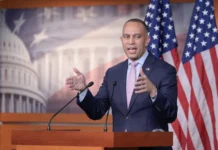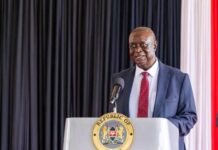Nairobi, Kenya — The Independent Electoral and Boundaries Commission (IEBC) is grappling with a deepening financial and legal crisis, with its Chief Executive Officer, Marjan Hussein Marjan, now facing the possibility of civil jail over unpaid legal costs amounting to more than Sh441 million.
Appearing before the Senate’s Justice, Legal Affairs and Human Rights Committee on Thursday, Marjan revealed that the commission is drowning in legal expenses, with total accumulated legal fees currently standing at Sh2.1 billion.
“The commission CEO has been cited for contempt of court orders and risks committal to civil jail due to the Commission’s inability to settle the awarded costs,” Marjan told the committee.
The embattled CEO warned that the commission is staring at even higher legal bills as several pending court cases are expected to conclude before the end of the current financial year, adding to the already overwhelming financial obligations.
A significant portion of the legal debt — Sh554.37 million — stems from the 2022 Presidential Election petition, where Azimio la Umoja and other parties challenged President William Ruto’s victory.
While the commission has managed to negotiate and reduce some of the debts by approximately Sh642.6 million, Marjan cautioned that final court taxations could trigger an upward review of legal costs.
The legal debt is part of IEBC’s broader pending bills, which have now ballooned to Sh3.79 billion, threatening the commission’s operations. Among these are:
- Sh298.98 million owed to the Postal Corporation of Kenya for services rendered during the 2022 General Election,
- Sh837.60 million owed to contractors for the supply of goods and services.
Marjan warned that should the commission fail to settle these debts, its assets could be seized and auctioned, potentially crippling IEBC’s ability to perform its constitutional duties.
The CEO blamed persistent underfunding by the National Treasury for the crisis, stating that the current budgetary allocation for the 2024–2025 financial year falls far short of what is needed to clear the outstanding bills.
“Given the current budget allocation versus the magnitude of the bills, the full amount cannot be cleared within the FY 2024–2025 budget,” he explained.
Marjan cautioned that unless the pending bills are urgently addressed, the commission may be unable to conduct essential functions such as by-elections and other electoral processes, as service providers may withdraw cooperation over unpaid dues.
The Senate committee, chaired by Bomet Senator Hillary Sigei, is now under pressure to spearhead possible interventions, including pushing for legislative amendments or additional funding to help the commission avert a full-blown operational collapse.
Despite repeated pleas for increased funding, Marjan lamented that responses from the National Treasury have been minimal and insufficient.
“We urge the commission to ensure adequate budgetary allocation and push for the enactment of election-related legislation. These measures are essential to ensure electoral preparedness ahead of the 2027 General Election,” Marjan concluded.
The IEBC has projected a Sh57.4 billion budget for the 2027 polls but remains entangled in mounting debts and uncertainty over its financial future.
By Were Kelly



















